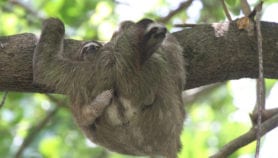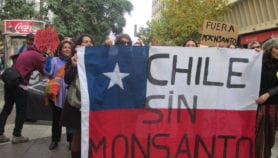By: Tamar Kahn
Send to a friend
The details you provide on this page will not be used to send unsolicited email, and will not be sold to a 3rd party. See privacy policy.
[NORTHERN CAPE, South Africa] A group of South African hunter-gatherers is to receive six per cent of all royalties granted to South Africa’s leading research organisation from a potential anti-obesity drug derived from the local hoodia plant.
Under the deal, the South African Council for Scientific and Industrial Research (CSIR) will also pay the San community eight per cent of all milestone payments received from Phytopharm, its UK-based licencee for the drug. The money will be used for the "general upliftment, development and training of the San community".
The income will be paid to a "San Hoodia Benefit Sharing Trust", made up of a nonvoting observer appointed by South Africa’s Department of Science and Technology, a CSIR representative, and three representatives appointed by the San Council.
The trust will also include three representatives appointed by the Working Group of Indigenous Minorities in Southern Africa (Wimsa), an organisation that advocates and lobbies for San rights; as well as a member of Wimsa and a professional appointed by the San Council.
The milestone payments to the San are expected to amount to between US$1 million and US$1.5 million over the next four years, with the first payment of about US$32,000 backdated to March 2002. The San will only receive royalty payments once the drug goes to market, which is not expected before 2008.
The release of the details of the agreement represents the end a controversy that erupted two years ago when it emerged that CSIR scientists had isolated and patented the active ingredient in the hoodia plant, which the San people have used for centuries to stave off hunger and thirst.
CSIR sold the development rights for the active ingredient of the appetite-suppressing hoodia plant, known as p57, to Phytopharm, which in turn sold the rights to Pfizer. At the time, it was unclear how — if at all — the San people would benefit from the CSIR’s dealings with pharmaceutical companies.
Earlier this year, it was announced that a deal between the CSIR and the San had been struck (see African tribe seals benefit-sharing deal.) but it was not revealed exactly how the royalties would be split.
Petro Terblanche, head of the CSIR’s Biochemtek division, emphasises that the anti-obesity drug is still in clinical trials, and that although results so far are promising, its commercial success is not guaranteed.
If Pfizer decides to base the drug on extracts from a botanical source, the required hoodia will be cultivated in South Africa, she says.
More on Bioprospecting
News
Combining cassava species could lead to better crops
[SAO PAULO] Combining tissues from different cassava species may lead to a new method for improving t ...16/10/12
News
Biodiversity data gaps ‘need bridging’ to meet global targets
[HYDERABAD] Global biodiversit ...11/10/12
News
Meeting puts socioeconomic impact on biosafety agenda
[HYDERABAD] An international treaty meeting on biosafety has recommended to include the socioeconomic ...09/10/12
Feature
Guide and glossary to CBD
The Convention on Biological Diversity (CBD) has spawned a series of agreements and technical ...07/10/12








